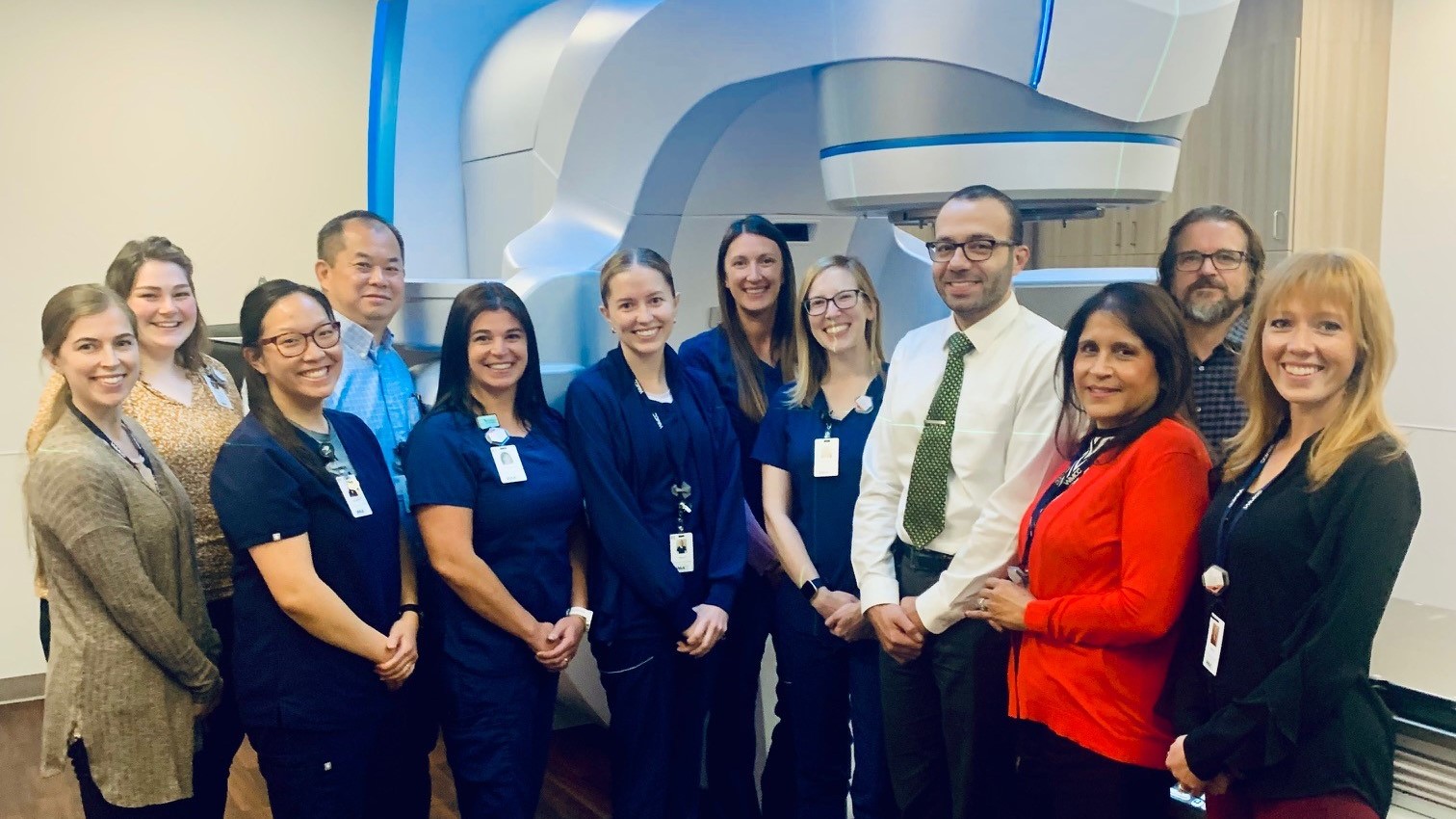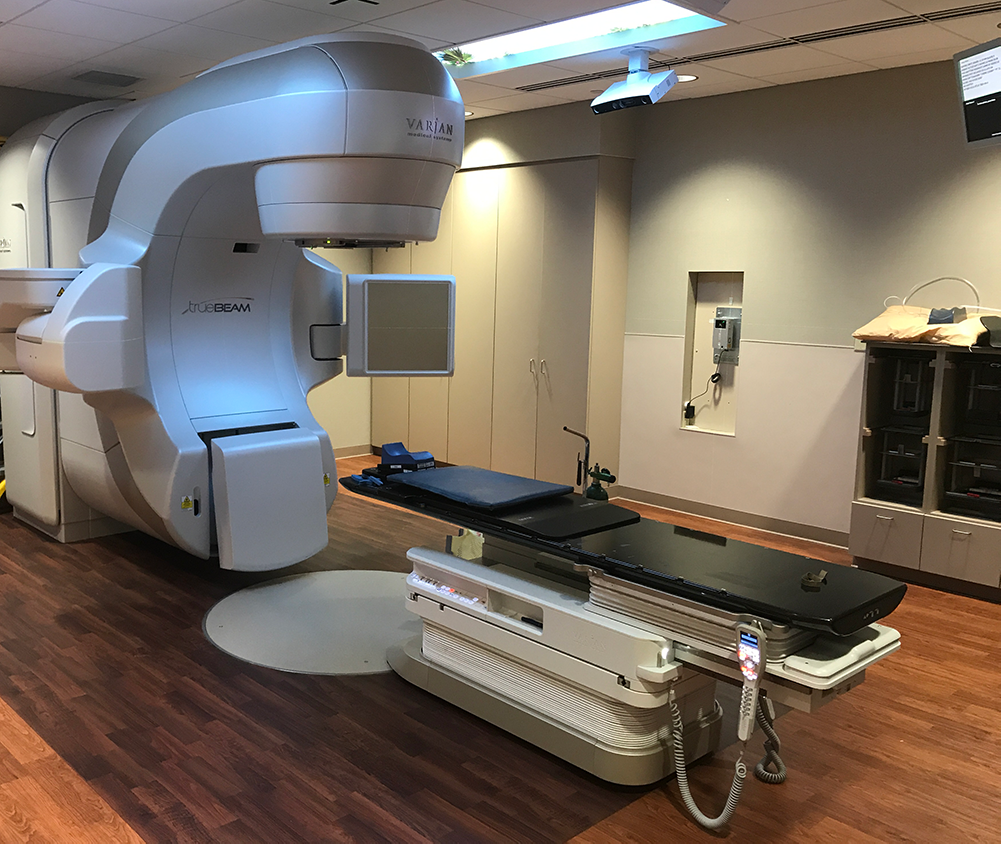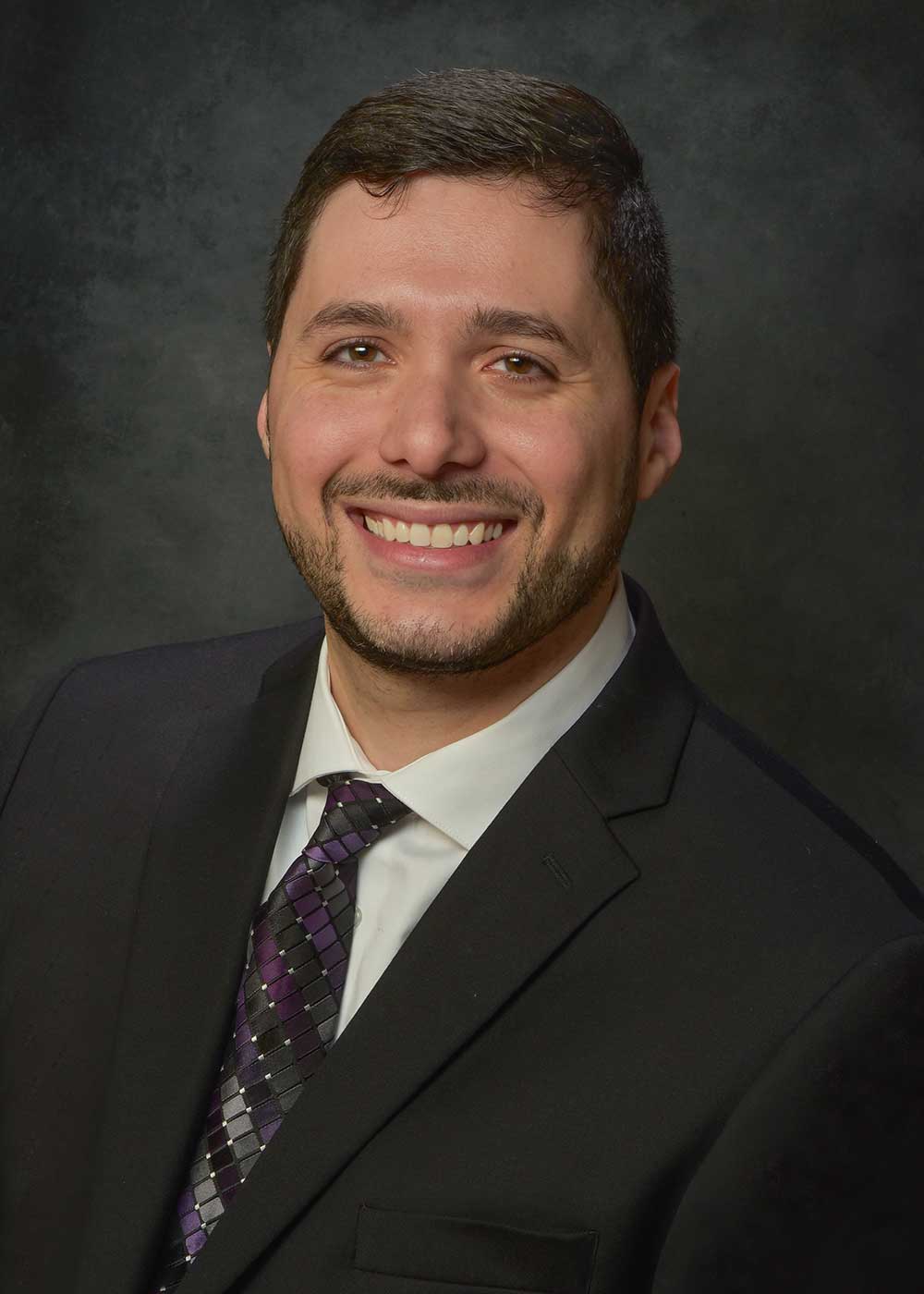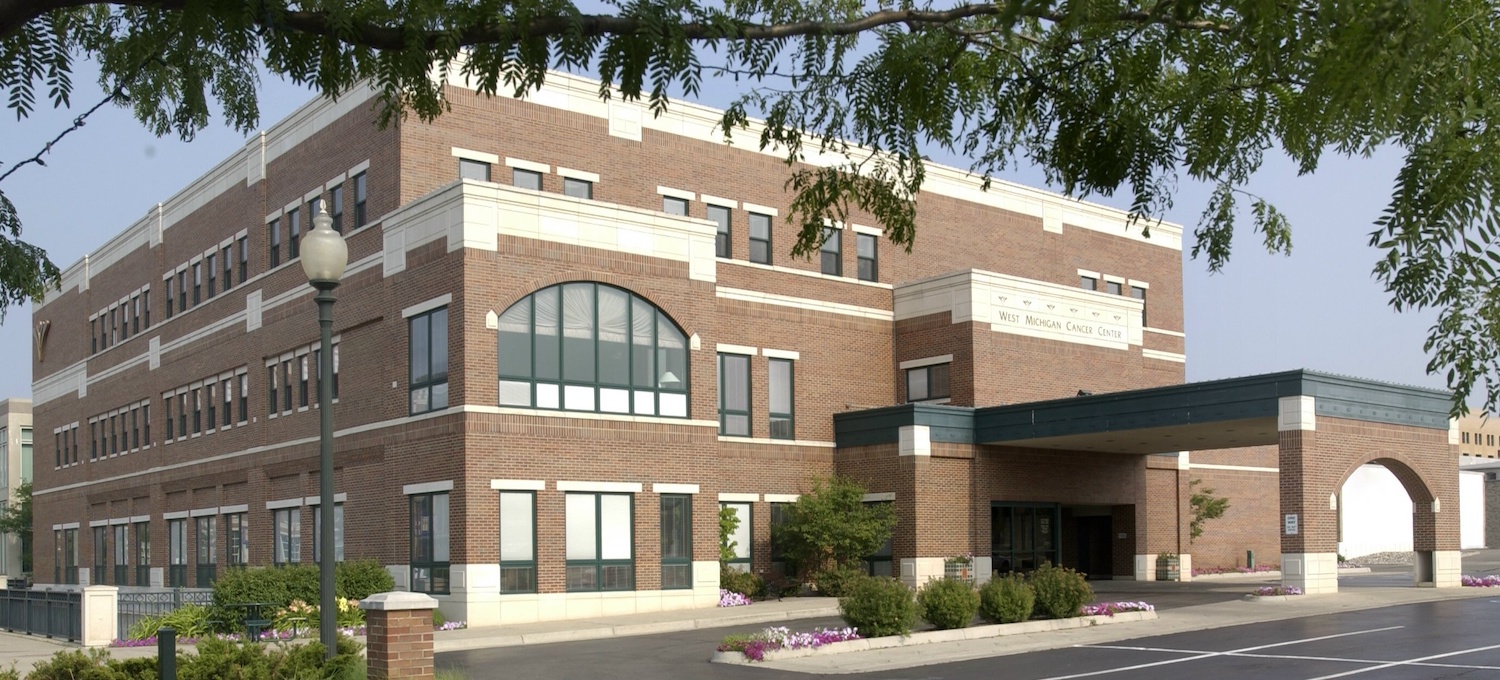Our expertise.
WMCC is Southwest Michigan’s most experienced cancer treatment center, providing thousands of patients with compassionate, lifesaving therapies for more than 30 years. As the region’s leader in cancer care, our radiation oncology program is the centerpiece. If your treatment plan includes radiation therapy, you can rest assured that it will be given safely and effectively by highly-trained, board-certified providers and team members.

What Is Radiation Therapy?
Radiation therapy is one of the most common treatments for cancer—utilized in more than half of all cases. Radiation therapy uses high-energy X-rays to shrink tumors safely and damage cancer cells. Radiation oncologists use this important therapy as a stand-alone treatment or in combination with other therapies, including surgery and chemotherapy.
Radiation therapy is used at various stages of cancer treatment and for different goals of care. In many cases, radiation therapy is essential to controlling or eliminating a patient’s disease. Sometimes, radiation therapy can be used to shrink a tumor before surgery or chemotherapy. Following those treatments, it can be used to kill any remaining cancer cells.
Other times, radiation therapy is used to alleviate symptoms, such as pain, which can occur in advanced, late-stage cancer. Patients with certain non-cancerous conditions like meningiomas or keloids may also benefit from radiation therapy.
Our radiation oncology team and our technology are second to none. Our radiation oncologists are highly skilled in their field, receiving specialized training at academic medical centers ranked among the most prestigious in the nation. We utilize state-of-the-art technology to bring our patients the most advanced treatment. Our specialists are committed to providing novel therapies that have proven effective and safe in treating cancer patients.
Meet Our Team
The WMCC Division of Radiation Oncology is composed of skilled and experienced providers to deliver the most comprehensive care for you or your loved one. Each team member is dedicated to providing you with safe, effective, and compassionate care. Your treatment begins with the radiation oncologists, the physicians who will oversee your radiation therapy treatment course.
These physicians work with other radiation oncology team members to create an optimal treatment plan and ensure each treatment is delivered appropriately.
Your radiation oncologist will follow your progress, manage any treatment-related side effects, and adjust the treatment plan as necessary.
Before, during, or after your treatment, you may also see an advanced practice provider. For patients under the care of additional cancer physicians, such as medical oncologists and surgeons, your radiation oncologist will work collaboratively with them during all phases of your treatment journey.
To learn more about a specialist – click on their image below.

Radiation Oncology Team Members
The prospect of radiation therapy may make you anxious. We understand that you may be worried about side effects and safety concerns. At WMCC, we want to assure you that your treatment plan will be customized just for you and carried out by a dedicated team of medical professionals.
Some you will meet in person, while others will be working behind the scenes to plan your care. The physicians work with other radiation oncology team members to create an optimal treatment plan and ensure each treatment is delivered appropriately.
- Radiation Therapists
- Medical Physicists
- Dosimetrists
- Nurse Liaisons
- Social Workers
- Registered Dietitian
Radiation Therapists work with radiation oncologists to deliver your radiation treatments under the physician’s prescription and supervision. Daily, they maintain records and perform quality assurance checks to ensure the treatment machines are working properly.
Medical Physicists work directly with the radiation oncologist during treatment planning and delivery. They oversee the work of the dosimetrist and help ensure that complex treatments are accurately planned and delivered for each patient. They also make sure the equipment works properly by taking precise measurements of the radiation beam and performing other safety tests on a regular basis.
Dosimetrists carefully create a radiation therapy treatment plan utilizing the latest treatment planning software. They work to optimize a treatment plan to best treat a patient’s tumor while minimizing exposure to the surrounding organs. Since treatment plans are often very complex, dosimetrists work with the radiation oncologist and the medical physicist to create the most optimal, customized treatment plan for your individual case.
Radiation Oncology Nurse Liaisons and Medical Assistants work together with radiation oncologists and radiation therapists to care for you during your treatments. They will explain the possible side effects of treatment and provide information and resources to help you best manage them. They will monitor you throughout your treatment course and help you and your family optimize and cope with changes you may experience.
Our Registered Dietitian works with patients to help them maintain adequate nutrition during their treatment course. They can help modify your meal plan if side effects from treatment impact appetite, cause nausea, or otherwise alter how you take in nutrition. They can also help determine what you can eat and provide recipes, menu suggestions, and information on ready-to-use nutritional supplements.
- Radiation Therapists
- Medical Physicists
- Dosimetrists
- Nurse Liaisons
- Social Workers
- Registered Dietitians
Radiation Therapists work with radiation oncologists to deliver your daily radiation treatments under the physician’s prescription and supervision. They maintain daily records and regularly examine the treatment machines to make sure they are working properly.
Medical Physicists work directly with the radiation oncologist during treatment planning and delivery. They oversee the work of the dosimetrist and help ensure that complex treatments are accurately planned and delivered for each patient. They also make sure the equipment works properly by taking precise measurements of the radiation beam and performing other safety tests on a regular basis.
Dosimetrists carefully create a radiation therapy treatment plan utilizing the latest treatment planning software. They work to optimize a treatment plan to best treat a patient’s tumor while minimizing exposure to the surrounding organs at risk. Since treatment plans are often very complex, dosimetrists work with the radiation oncologist and the medical physicist to create the most optimal, customized treatment plan for your individual case.
Radiation Oncology Nurse Liaisons and Medical Assistants work together with radiation oncologists and radiation therapists to care for you during your treatments. Your oncology nurse liaison will explain the possible side effects of treatment and provide information and resources to help you best manage them. He or she will monitor you throughout your treatment course and help you and your family optimize and cope with changes you may experience.
Social Workers are available to provide a variety of supportive services to you and your family. They can provide brief counseling to help you and your family cope with your diagnosis of cancer and with your treatment. They can also help connect you with supportive resources during and after your treatment course.
Registered Dietitians work with patients to help them maintain adequate nutrition during their treatment course. They can help modify your meal plan if side effects from treatment impact appetite, cause nausea, or otherwise alter how you take in nutrition. They can also help determine what you can eat and provide recipes, menu suggestions, and information on ready-to-use nutritional supplements.
What We Treat
Radiation therapy is used to treat many different cancers, including:
- Brain Tumors
- Spine Tumors
- Breast Cancer
- Head and Neck Cancers
Certain noncancerous conditions like meningiomas or keloids can also be treated with radiation therapy.
Your First Visit
What To Expect
The first step is to meet with a WMCC radiation oncologist and/or advanced practice provider to discuss your diagnosis and determine if radiation therapy is the right form of treatment for you. If the doctor decides to move forward, you will learn about the number of treatments you will need based on your disease type and stage. In some cases, your doctor may decide that radiation therapy is best suited for use at a later stage, so you may receive other cancer treatments first.

- Consultation
- Radiation Simulation
- Treatment Plan
- Treatment Delivery
The first step is to meet with a WMCC radiation oncologist to discuss your diagnosis and determine if radiation therapy is the right form of treatment for you. If the doctor decides to move forward, you will learn about the number of treatments you will need based on your disease type and stage. In some cases, your doctor may decide that radiation therapy is best suited for use at a later time, so you may receive other cancer treatments first.
Preparation for radiation therapy treatment involves a session called a simulation. It typically includes the following steps:
- You will lie on the same type of solid table for your simulation as you will for your treatments.
- Lying still in the proper position is very important for treatment success. Your healthcare team may use cushions and immobilization devices to position you at the best angle for treatment.
- You will then undergo treatment planning CT scans (X-rays).
- After the physician reviews and approves your scan, your treatment team may mark the area with very small permanent tattoos. These tattoos are usually the size of a freckle. In certain cases, permanent tattoos are not needed.
- You have completed your part of the preparation. The clinical team will now begin working with the physician during the next step in the preparation process.
Following the radiation simulation, a customized treatment plan will be created for you. This is done to target the tumor with the least amount of impact on surrounding tissue.
Radiation therapy treatment sessions are typically given daily for 1 to 7 weeks. The total number of treatments depends on the size and type of cancer. Each session usually takes about 10 to 30 minutes. Often, the individual is given each weekend off from therapy, which helps with the restoration of normal cells. At each session, you will lie on a treatment table and team members will position you with the same immobilization devices used at the time of the initial simulation. It is important to lie as still as possible.
Radiation therapy involves using a linear accelerator machine, which delivers radiation to a designated area under the direction of a physician. The machine may move around the table in order to deliver the radiation at the specifically planned angles. The machine will make a buzzing sound as it delivers radiation and you should not feel any pain. You will be able to talk with your team through the room’s intercom, if necessary. Your doctor will be in the clinic and available to participate in the treatment as needed.
Our Technology & Therapies
There are two main types of radiation therapy, external beam and internal (i.e., brachytherapy). The type of radiation therapy that you may have depends on many factors, including:
- The type of cancer
- The size of the tumor
- The tumor’s location in the body
- How close the tumor is to normal tissues that are sensitive to radiation
- Your general health and medical history
- Whether you will have other types of cancer treatment

- Treatment Machines
- Treatment modalities
- Machine Status
- Three-Dimensional Conformal Radiation Therapy (3D-CRT)
Static treatment fields are designed to conform to the tumor while blocking nearby organs that could be sensitive to radiation. Treatment beams are designed specifically for each patient and a number of tools will be used for each case depending on tumor depth, size, shape, and proximity to adjacent organs. - Stereotactic Radiosurgery (SRS) & Stereotactic Body Radiation Therapies (SBRT)
A high dose of radiation is concentrated to smaller tumors while giving low levels of radiation dose to surrounding healthy tissues. The full stereotactic treatment course will typically be delivered in five or fewer treatment sessions. - Intensity Modulated Radiation Therapy (IMRT)
Used to treat irregular tumor volumes where the radiation dose needs to be carved around adjacent healthy tissues. Treatment plans are developed by the planning team with the use of sophisticated computer software to deliver sufficient radiation doses to the tumor while sparing healthy organs. - Image-Guided Radiation Therapy (IGRT)
Uses advanced imaging technology to verify the tumor position, as well as adjacent healthy organs, before each treatment. The imaging is used to align and adjust each treatment to ensure precise delivery. - Surface Monitoring with AlignRT®
Three dimensional cameras are used to track the patient’s position and compare it to the ideal treatment position. The system can be used to halt the treatment session if the patient moves out of the ideal treatment position. - Brachytherapy
Done by placing a radioactive source inside the patient’s body either inside or immediately adjacent to the tumor. This technique allows the physician to treat with high doses of radiation to small areas in a shorter time frame.
Click this link to check the treatment machine status.
FAQs
Finding out you need radiation therapy can be a stressful experience. Knowing your options and becoming an informed patient can help you gain a sense of control over your treatment. We believe an important part of compassionate care is helping patients understand the treatments they are prescribed.
Many patients have questions about the side effects of radiation therapy. Side effects depend on the area being treated and typically appear by the second or third week of treatment.
Side effects may last for several weeks after treatment is completed. Some common side effects include fatigue, skin irritation of the treatment site, and hair loss within the treatment site.
Here we have compiled a list of other common questions you might have about radiation therapy. We encourage you to discuss any additional questions that arise with your healthcare team.
Skin irritation is a common side effect of radiation therapy but only occurs within the area being treated.
Moisturizing can help minimize skin changes. Your physician will recommend which lotions, creams, or ointments to use. Patients should also protect treated areas from the sun and not wear tight fitting clothes on the treatment area to prevent worsening skin reactions. Maintaining adequate hydration can also be beneficial throughout treatment.
Any severe changes to breathing, heart rate, blood pressure, or pain should be promptly evaluated in the hospital emergency room. If you are unsure how to manage side effects, there are nurses available via phone to contact during business hours and an on-call physician available via phone after hours.
Available Clinical Trials
West Michigan Cancer Center Radiation & Surgical Specialties has an active clinical research program. WMCC is a member of the Cancer Research Consortium of West Michigan, a division of the National Cancer Institute’s Clinical Oncology Research Program. Your radiation oncologist can provide guidance and connect you with one of our research protocol nurses to discuss clinical trials that may help address your specific type of cancer.











Our Social Worker is available to provide a variety of supportive services to you and your family. She can provide crisis support during tough times and find resources to help you and your loved ones. They can also help plan for your care in the future.